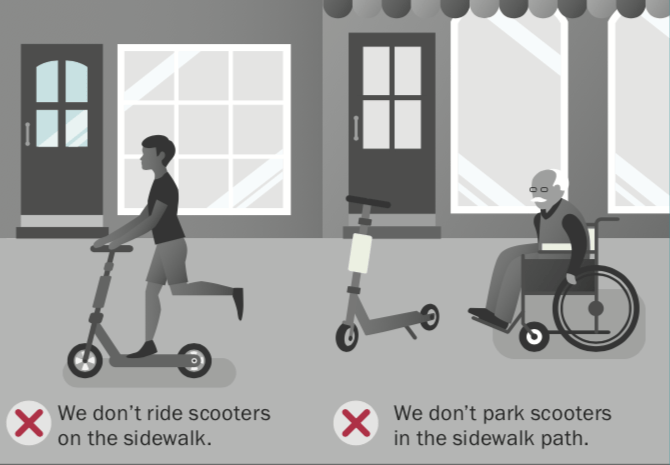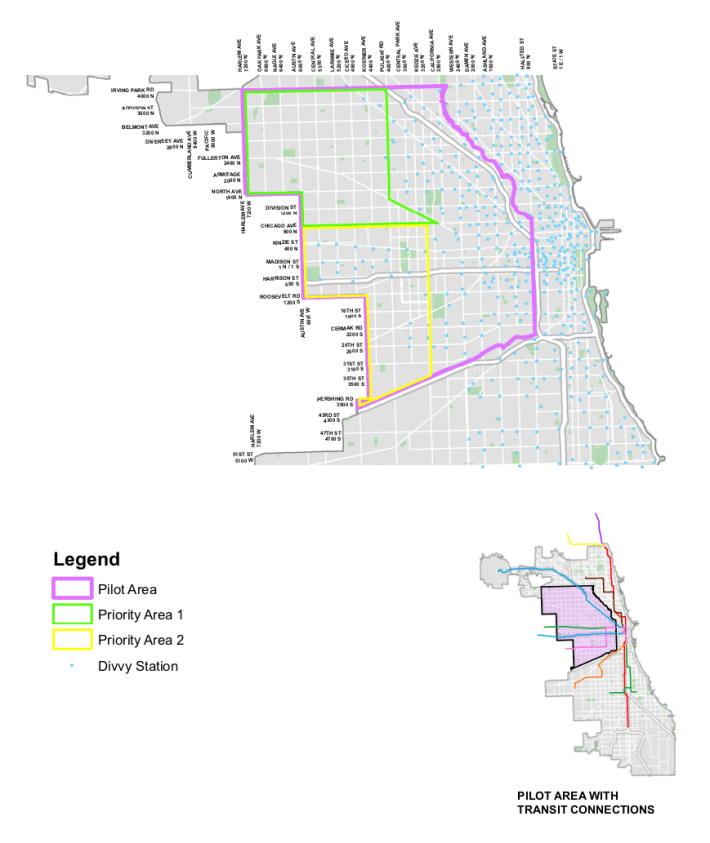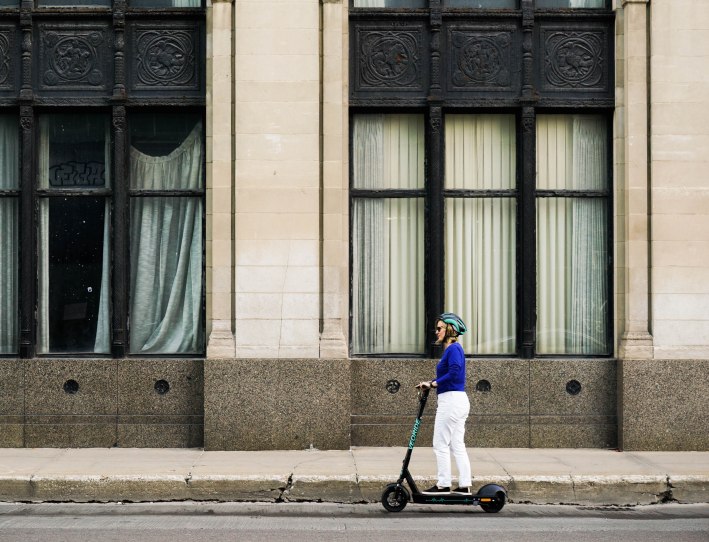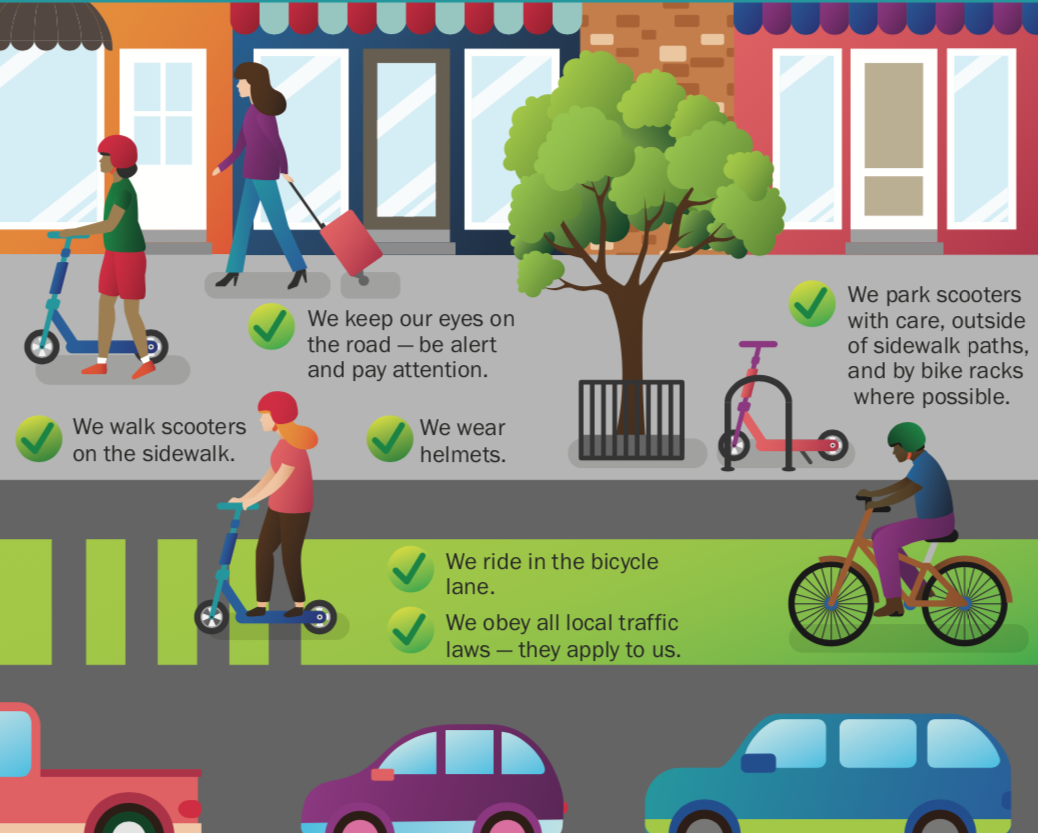The Chicago transportation scene is about to become a little more, um, interesting.
Today the city of Chicago announced the ten, count 'em, ten dockless electric scooter companies participating in the four-month pilot on the West and Northwest sides, starting this Saturday. That means that a total of 2,500 of these gizmos will be ridden by folks sharing streets and bike lanes, and off-street trails with other users, and parked on sidewalks, hopefully out of the way of pedestrians and wheelchair users. (Scooters may be ridden on all off-street trails within the pilot area, with the notable exception of the busy Bloomingdale Trail, aka The 606, due to a Chicago Park District prohibition.)
Here are the ten companies participating in the four-month test:
- Bird
- Bolt
- grüv
- JUMP
- Lime
- Lyft
- Sherpa
- Spin
- VeoRide
- Wheels
It's worth noting that Lyft is the company that runs the city-owned Divvy bike-share system. Their arch-rival Uber owns JUMP. Bird and Lime are two of the most prominent scooter companies at this stage of the fledgling industry. VeoRide is the only Chicago-based vendor. Each company may deploy 250 vehicles.
On the bright side, scooters offer zippy, sweat-and-exercise-free ride that may appeal to some people who don't use bike-share, so they could replace some private car and ride-hailing trips. They may work as an option for some people with physical challenges that prevent them from riding a bike. And some aldermen have expressed the hope that they can help fill in gaps in the transportation network in areas with mediocre transit access.

The potential downsides include the relatively high risk of injuries for users as well as pedestrians, since scooters are commonly, though illegally, ridden on sidewalks. Speaking from experience, it seems like a good idea to strap-on a helmet if you're going to ride one of these gadgets any distance, especially on your first trips, which is when a third of all scooter injuries take place. In addition to the aforementioned sidewalk clutter issue, vandalism eyesores are a common annoyance in scooter cities -- there's a whole Instagram account dedicated to images of scooters being destroyed.
With those caveats out of the way, let's look at the nitty-gritty of the upcoming pilot. Here's the 50-mile-square coverage area; geofencing will make the devices gradually slow to a halt if they are taken outside of the pilot zone, so don't expect to see any public scooters on the Lakefront Trail anytime soon. For equity purposes, vendors are required to deploy 25 percent of their fleets in each of the two priority areas, which have relatively few Divvy stations.

The scooters are limited to 15 mph, cannot be ridden on sidewalks, and have a curfew -- the companies must remove them from the streets between 10 p.m. and 5 a.m. each day, during which time they will be recharged. The plus side of that policy is that it will help prevent people from scooting while intoxicated (although I'd certainly rather be struck by a drunk scooter rider than a drunk driver.) The downside is that it will generate a lot of motor vehicle trips by the distribution crews, possibly canceling out any environmental benefits of the devices.
According to the pilot rules, improperly parked scooters must be moved out of the way within two hours. Vendors must provide the city with real-time data on operations, ridership, and safety, or risk getting their license to operate revoked.
Through the application process, the scooter companies were required to submit plans for how they will engage with local businesses; provide equitable services to folks without bank accounts, credit cards and/or smartphones; ensure access for people with disabilities; and hire locally. Highlights of the plans include:
- Scooters with seats to allow for easier access to people with disabilities
- The ability for scooters to be unlocked via text for those without smartphones
- A cash payment option for unbanked people
- Plans to engage the local merchants to provide free helmets to users
The city says it and the vendors are rolling out an education campaign to promote safe riding, encourage helmet use, inform users of the 18 or older age requirement (16 with a guardian’s consent), and demonstrate proper parking and riding protocol. A safe-riding and proper parking flyer will be distributed to scooter users, community groups, alderman, and other stakeholders.
Over the four-month period, the city will seek feedback from residents through surveys, 311 and vendor data, and regular stakeholder meetings to check in on how the pilot is going. The city says the pilot’s results will inform future policymaking.

The participating vendors say they're stoked to hit the streets of Chicago for the city's first public scooter pilot. "As the only e-scooter shared program provider based in Chicago, we are proud to be chosen to help the city cut down on traffic congestion, pollution and commuting stress,"said VeoRide’s CEO, Candice Xie in a statement, adding that the company's devices "offer residents a new, affordable and convenient alternative to handle the last mile of their commutes, including the often logistically tough trek from trains and bus stations to their homes.”
"Uber is thrilled to have its state-of-the-art JUMP scooters included in Chicago’s first-ever scooter pilot program," said local JUMP manager Robert Eckhardt in a statement. "We look forward to working closely with the city to continue expanding micromobility options to all Chicagoans while encouraging safe riding behaviors, from wearing helmets to following the rules of the road."
So get ready, Chicago, come Saturday there's going to be a new way to get around town -- for better or worse.
For more information on the scooter pilot, go to: www.chicago.gov/scooters






